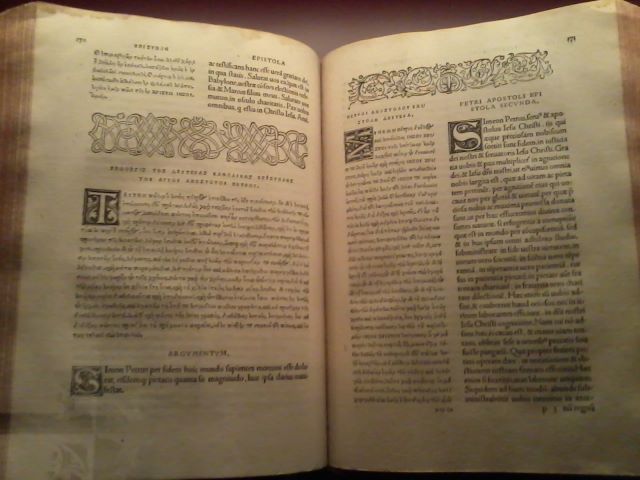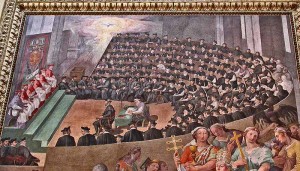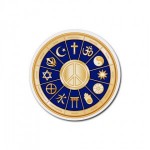The 1516 first edition of Erasmus’ Greek/Latin Novum Instrumentum, important in Luther’s conversion.

The room where Luther’s “Table Talks” took place in Wittenberg, Germany.

HT: James White

 At the Council of Trent in the 16th century, the Roman Catholic Church placed its eternal and irrevocable curse on the Gospel, announcing it as actually heretical. I am certain that in the hearts and minds of the delegates at the Council, this was never intended – not even for a moment – but that is in fact what happened.
At the Council of Trent in the 16th century, the Roman Catholic Church placed its eternal and irrevocable curse on the Gospel, announcing it as actually heretical. I am certain that in the hearts and minds of the delegates at the Council, this was never intended – not even for a moment – but that is in fact what happened.
The most relevant Canons are the following:
Canon 9. If anyone says that the sinner is justified by faith alone…, let him be anathema.
Canon 11. If anyone says that men are justified either by the sole imputation of the justice of Christ or by the sole remission of sins,… let him be anathema.
Canon 12. If anyone says that justifying faith is nothing else than confidence in divine mercy (supra, chapter 9), which remits sins for Christ’s sake, or that it is this confidence alone that justifies us, let him be anathema.
Canon 24. If anyone says that the justice received is not preserved and also not increased before God through good works but that those works are merely the fruits and signs of justification obtained, but not the cause of the increase, let him be anathema.
Canon 30. If anyone says that after the reception of the grace of justification the guilt is so remitted and the debt of eternal punishment so blotted out to every repentant sinner, that no debt of temporal punishment remains to be discharged either in this world or in purgatory before the gates of heaven can be opened, let him be anathema.
Canon 32. If anyone says that the good works of the one justified are in such manner the gifts of God that they are not also the good merits of him justified; or that the one justified by the good works that he performs by the grace of God and the merit of Jesus Christ…does not truly merit an increase of grace and eternal life… let him be anathema.
As Dr. Michael Horton rightly noted, “It was, therefore, not the evangelicals who were condemned in 1564, but the evangel itself. The ‘good news,’ which alone is ‘the power of God unto salvation’ was judged by Rome to be so erroneous that anyone who embraced it was to be regarded as condemned.”
The question then is, do the anathemas of Trent still stand? Mike Gendron addresses this question in an article entitled “Does the Vatican Still Condemn Christians?” Continue reading
 “If it is I who determine where God is to be found, then I shall always find a God who corresponds to me in some way, who is obliging, who is connected with my own nature. But if God determines where he is to be found, then it will be in a place which is not at all congenial to me. This place is the Cross of Christ. And whoever would find him must go to the foot of the Cross, as the Sermon on the Mount commands. This is not according to our nature at all, it is entirely contrary to it. But this is the message of the Bible, not only in the New but also in the Old Testament . . . .” – Dietrich Bonhoeffer, quoted in Eric Metaxas, Bonhoeffer (Nashville, 2010), page 137.
“If it is I who determine where God is to be found, then I shall always find a God who corresponds to me in some way, who is obliging, who is connected with my own nature. But if God determines where he is to be found, then it will be in a place which is not at all congenial to me. This place is the Cross of Christ. And whoever would find him must go to the foot of the Cross, as the Sermon on the Mount commands. This is not according to our nature at all, it is entirely contrary to it. But this is the message of the Bible, not only in the New but also in the Old Testament . . . .” – Dietrich Bonhoeffer, quoted in Eric Metaxas, Bonhoeffer (Nashville, 2010), page 137.
“One new discovery of the glory of Christ’s face and the fountain of his sweet grace and love will do more towards scattering clouds of darkness and doubting in one minute than examining old experiences by the best mark that can be given a whole year.” – Jonathan Edwards, quoted in George M. Marsden, Jonathan Edwards: A Life (New Haven, 2003), page 226.
“Every religious system in the universe is predicated by the notion that we can be good enough to meet God, except Christianity.” – Stephen Nichols
“Christianity is based on the truth that sinners need a Savior, not merely a coach or a therapist.” – Dr. Al Mohler
“The solemn fact is that none of us can tell the difference between the beginning of backsliding and the beginning of apostasy. Both look the same.” – Sinclair Ferguson
“Calvin had no weapon but the Bible… Calvin preached from the Bible every day, and under the power of that preaching the city began to be transformed. As the people of Geneva acquired knowledge of God’s Word and were changed by it, the city became, as John Knox called it later, a New Jerusalem from which the gospel spread to the rest of Europe, England, and the New World.” – James Montgomery Boice
“Oh, you are not dealing with trifles when you are dealing with the love of God to you. It is not a spare corner of the heart of God that He gives to you, as you may give a little love to the criminals in the jails, but the great, inconceivably vast heart of God belongs as much to every Christian as if there were not another being in the world for God to love! Even as Jehovah loves His Only-begotten, so does He love each one of His children.” – C. H. Spurgeon, The Treasury of the Old Testament (London, n.d.), III:568
“I can feelingly say, he has proved himself stronger than I and his goodness superior to all my unworthiness. He tells me (and enables me to believe it) that I am fair, and there is no spot in me. Though an enemy, he calls me his friend; though a traitor, a child; though a beggared prodigal, he clothes me with the best robe and has put a ring of endless love and mercy on my hand. And though I am sorely distressed by spiritual and internal foes, afflicted, tormented and bowed down almost to death with the sense of my own present barrenness, ingratitude and proneness to evil, he secretly shows me his bleeding wounds and softly and powerfully whispers to my soul, ‘I am thy great salvation.’ His free distinguishing grace is the bottom on which is fixed the rest of my poor weary tempted soul. On this I ground my hope, often times when unsupported by any other evidence, save only the Spirit of adoption received from him. When my dry and empty barren soul is parched with thirst, he kindly bids me come to him and drink my fill at the fountainhead. In a word, he empowers me to say with experiential evidence, ‘Where sin abounded, grace did much more abound.’ Amen and amen.” – Joseph Hart (1712-1768), quoted in Peter C. Rae, “Joseph Hart and His Hymns,” Scottish Bulletin of Evangelical Theology 6 (1988): 22-23.
“The church at Laodicea was in danger of judgment. What offended the Lord was not their intense sin but their moderate Christianity: “You are neither cold nor hot. Would that you were either cold or hot! You are lukewarm” (Revelation 3:15-16). They weren’t heretical or wacko. They were somewhere in the mushy middle. They neither promoted the gospel nor opposed it. They thought the Bible had some good ideas, but they didn’t relish it. They wanted their kids to grow up moral, but not missional. They found some space in their busy weekend schedule for going to church, but they didn’t redesign their whole lives around the cause of the gospel. Jesus would not put up with it: “I will spit you out of my mouth” (verse 16). There is a kind of Christianity that Jesus finds distasteful. But still, Jesus lovingly reached out to them: “Behold, I stand at the door and knock. If anyone hears my voice and opens the door, I will come in to him and eat with him, and he with me” (verse 20). He didn’t force himself on them. He offered himself with a humble knock on their door.
Notice the word “anyone.” He didn’t say “If the pastor hears” or “If the elders hear” but “If anyone hears my voice.” Martyn Lloyd-Jones, in his book on revival, observes a striking pattern in Christian history. A new movement of blessing never begins by a majority vote. It begins when one person, or a small group of people, “begin to feel this burden, and they feel the burden so much that they are led to do something about it. . . . It may be anybody.” Don’t think you can’t do anything. Don’t wait for someone else. Jesus offers himself to anyone: “If anyone hears my voice and opens the door . . . .”” – Ray Ortlund
“All theology is also spirituality, in the sense that it has an influence, good or bad, positive or negative, on its recipients’ relationship or lack of relationship with God. If our theology does not quicken the conscience and soften the heart, it actually hardens both; if it does not encourage the commitment of faith, it reinforces the detachment of unbelief; if it fails to promote humility, it inevitably feeds pride.” – J. I. Packer, A Quest for Godliness (Wheaton, 1994), page 15.
“The Enlightenment brought to the discussion of life the proposition that the human being has matured to the point that he must become independent of any outside information about life. ‘He has come of age,’ Kant wrote. Independence from church and state eventually led to independence from God and creation as well. For now God no longer shed light on our understanding, but man could begin to see the world the way he wanted to. If reason is the only key to truth, anything may become reasonable to the one who does the explaining to himself.” – Udo Middelmann, Footnotes, December 1998, page 3.
“He will tend his flock like a shepherd.” Isaiah 40:11
“Jesus, the good shepherd, will not travel at such a rate as to overdrive the lambs. He has tender consideration for the poor and needy. Kings usually look to the interests of the great and the rich, but in the kingdom of our Great Shepherd he cares most for the poor… The weaklings and the sickly of the flock are the special objects of the Savior’s care… You think, dear heart, that you are forgotten, because of your nothingness and weakness and poverty. This is the very reason you are remembered.” – C. H. Spurgeon, Treasury of the Old Testament (London, n.d.), III:575-576.
“All sins are attempts to fill voids.” – Simone Weil, quoted in Barbara Brown Taylor, Speaking of Sin (Cambridge, 2001), page 67.
“It is a growing conviction of mine that no parish can fulfill its true function unless there is at the very center of its leadership life a small community of quietly fanatic, changed and truly converted Christians. The trouble with most parishes is that nobody, including the pastor, is really greatly changed… We do not want ordinary men. Ordinary men cannot win the brutally pagan life of a city like New York for Christ. We want quiet fanatics.” – John Heuss, Our Christian Vocation (Greenwich, 1955), pages 15-16.
“If I profess with the loudest voice and clearest exposition every portion of the truth of God except precisely that little point which the world and the devil are at that moment attacking, I am not confessing Christ, however boldly I may be professing Christianity. Where the battle rages, there the loyalty of the soldier is proved, and to be steady on all the battlefield besides is mere flight and disgrace to him, if he flinches at that one point.” – A follower of Martin Luther, 2 April 1526, quoted in Chronicles of the Schönberg-Cotta Family (New York, 1865), page 321.
“Walking around St James’s Park I thought intensely of the difference between Tolstoy and St Augustine. Tolstoy tried to achieve virtue, and particularly continence, through the exercise of his will; Augustine saw that, for Man, there is no virtue without a miracle.” – Malcolm Muggeridge, Like It Was: The Diaries of Malcolm Muggeridge (London, 1981), page 434.
“Let us consider this settled: that no one who has made progress in the school of Christ who does not joyfully await the day of death and final resurrection. . . . Let us not hesitate to await the Lord’s coming, not only with longing, but also with groaning and sighs, as the happiest thing of all. He will come to us as Redeemer.” – John Calvin, Institutes, 3.9.5.
“If we are Christians and do not have upon us the calling to respond to the lostness of the lost and a compassion for those of our kind, our orthodoxy is ugly and it stinks. And it not only stinks in the presence of the hippie, it stinks in the presence of anybody who’s an honest man. And more than that, I’ll tell you something else, orthodoxy without compassion stinks with God.” – Francis A. Schaeffer, Death in the City (Chicago, 1969), page 123.
“The man who has God for his treasure has all things in One. Many ordinary treasures may be denied him, or if he is allowed to have them, the enjoyment of them will be so tempered that they will never be necessary to his happiness. Or if he must see them go, one after one, he will scarcely feel a sense of loss, for having the Source of all things, he has in One all satisfaction, all pleasure, all delight. Whatever he may lose he has actually lost nothing, for he now has it all in One, and he has it purely, legitimately, forever.” – A. W. Tozer, The Pursuit of God (London, 1967), page 20.
Jeremiah 32:40 “I will make with them an everlasting covenant, that I will not turn away from doing good to them. And I will put the fear of me in their hearts, that they may not turn from me. 41 I will rejoice in doing them good, and I will plant them in this land in faithfulness, with all my heart and all my soul.”
The ground of our assurance of final perseverance and salvation is a covenant keeping God. Dr. John Piper explains in this 3 minute video excerpt:
We Should Learn This Verse from Desiring God on Vimeo.
 (1) The paperback version of “Twelve What Abouts – Answering Common Objections Concerning God’s Sovereignty in Election” is currently available at a 50% discount direct from the publisher, Solid Ground Christian Books. For those who wish to order 10 or more copies there is a 54% discount. Both deals can be found at this link.
(1) The paperback version of “Twelve What Abouts – Answering Common Objections Concerning God’s Sovereignty in Election” is currently available at a 50% discount direct from the publisher, Solid Ground Christian Books. For those who wish to order 10 or more copies there is a 54% discount. Both deals can be found at this link.
(2) Dr. Dan Wallace states the facts on the “Jesus had a wife” fragment here.
(3) There’s a variety of resources in this week’s Friday Ligonier $5 sale worth considering here.
 Michael P. Jensen’s book “How to Write a Theology Essay” could prove to be a valuable resource for anyone wishing to help people grasp true things about God. Each of the twenty chapters ends with a bullet-point summary (though there is more to the book than the summaries):
Michael P. Jensen’s book “How to Write a Theology Essay” could prove to be a valuable resource for anyone wishing to help people grasp true things about God. Each of the twenty chapters ends with a bullet-point summary (though there is more to the book than the summaries):
1. How not to lose heart before you start
•The topics of theology really matter
•The knowledge of God is not the preserve of the very clever
•Starting to write theology is a challenge that can be fun!
2. What is theology in any case?
•Theology is a species of reason, subject to the Word of God
•Theology is a form of speech
•Theology is evangelical: it is about God and his deeds
•Theology is evangelistic: it is an invitation to submit to the Lordship of Christ
3. What is a theology essay?
•An essay is an invitation to persuade
•The object of the theology essay is to say true things about God
•The theology essay deals with ideas and concepts
•It is not merely a summary of Scripture
4. The responsibility of theology
•Theology is answerable to God and must be done with prayerful reverence
•Theology is best done in service to God and his people
Continue reading
 Etiquette: a code of behavior that delineates expectations for social behavior according to contemporary conventional norms within a society, social class, or group.
Etiquette: a code of behavior that delineates expectations for social behavior according to contemporary conventional norms within a society, social class, or group.
I am currently doing some pre-marriage counseling with a couple. This morning I received this e-mail from the gentleman (names have been changed):
Hi Pastor John,
I have a request to pass to you from my fiance Dorothy. Feel free to decline if you are not completely comfortable. But, there is a married couple we know who are interested in receiving counseling with you. I am sure it is because Dorothy speaks of your help with such glowing praise! So, please let me know how to proceed, and again, please don’t feel obligated.
Hope you have a great day.
Clive
This was my reply:
Hi Clive,
Good to hear from you. I am so glad you and Dorothy are still enjoying the pre-marriage sessions and finding them useful.
Regarding the couple, may I ask if they are Christians and are part of a local Church? I ask this question because as a pastor (rather than merely a counselor) I am very sensitive in making sure that anything I do is never perceived in any way as what some call “sheep stealing.” That is when an individual or couple who are part of a local church assembly are prized away from the care of that leadership by an over zealous pastor. I know many pastors dont feel this kind of sensitivity in our day, but I feel it is very much like someone under the care of a doctor is encouraged by another doctor to be treated by them. Such a thing is not only extremely poor etiquette on the part of the doctor, but it may very well be illegal. It should never occur.
While meeting with me for marriage advice would not be a legal issue, I still feel the same principle of etiquette would apply and am very sensitive about this. I realise that I am more sensitive than most pastors on this issue. If the couple are part of a local Church, I would only wish to meet with them when there is full agreement between the couple and their local Church elders and that the elders give the go-ahead. If the couple are not under the care of local Church leadership, that is a very different matter. For instance, I was happy to meet with you and Dorothy because we have known each other for years and secondly, I knew you were not specifically under the care of local Church leadership.
Am I making sense?
Pastor John
Much confusion has resulted and continues to result from misunderstandings regarding the meaning of the visible church, the invisible church, and the relation between the two. In this message, Dr. Ligon Duncan seeks to clarify the meaning of this important and often neglected biblical doctrine.
 Three quotes and a question:
Three quotes and a question:
“The Enlightenment brought to the discussion of life the proposition that the human being has matured to the point that he must become independent of any outside information about life. ‘He has come of age, but man could begin to see the world the way he wanted to. If reason is the only key to truth, anything may become reasonable to the one who does the explaining to himself.” – Udo Middelmann, Footnotes, December 1998, page 3.
“If it is I who determine where God is to be found, then I shall always find a God who corresponds to me in some way, who is obliging, who is connected with my own nature. But if God determines where he is to be found, then it will be in a place which is not at all congenial to me. This place is the Cross of Christ. And whoever would find him must go to the foot of the Cross, as the Sermon on the Mount commands. This is not according to our nature at all, it is entirely contrary to it. But this is the message of the Bible, not only in the New but also in the Old Testament…” – Dietrich Bonhoeffer, quoted in Eric Metaxas, Bonhoeffer (Nashville, 2010), page 137.
 “I am trying here to prevent anyone saying the really foolish thing that people often say about Him: ‘I’m ready to accept Jesus as a great moral teacher, but I don’t accept His claim to be God.’ That is the one thing we must not say. A man who was merely a man and said the sort of things Jesus said would not be a great moral teacher. He would either be a lunatic – on the level with the man who says he is a poached egg – or else he would be the Devil of Hell. You must make your choice. Either this man was, and is, the Son of God: or else a madman or something worse. You can shut Him up for a fool, you can spit at Him and kill Him as a demon; or you can fall at His feet and call Him Lord and God. But let us not come with any patronizing nonsense about His being a great human teacher. He has not left that open to us. He did not intend to.” – C.S. Lewis, Mere Christianity, The MacMillan Company, 1960, pp. 40-41.)
“I am trying here to prevent anyone saying the really foolish thing that people often say about Him: ‘I’m ready to accept Jesus as a great moral teacher, but I don’t accept His claim to be God.’ That is the one thing we must not say. A man who was merely a man and said the sort of things Jesus said would not be a great moral teacher. He would either be a lunatic – on the level with the man who says he is a poached egg – or else he would be the Devil of Hell. You must make your choice. Either this man was, and is, the Son of God: or else a madman or something worse. You can shut Him up for a fool, you can spit at Him and kill Him as a demon; or you can fall at His feet and call Him Lord and God. But let us not come with any patronizing nonsense about His being a great human teacher. He has not left that open to us. He did not intend to.” – C.S. Lewis, Mere Christianity, The MacMillan Company, 1960, pp. 40-41.)
“But who do you say that I am?” – Jesus
 Did you see the headline on the Fox News website?:“Harvard professor unveils a fourth-century fragment of papyrus she says quotes Jesus referring to having a wife…”
Did you see the headline on the Fox News website?:“Harvard professor unveils a fourth-century fragment of papyrus she says quotes Jesus referring to having a wife…”
Many are making a big deal about this, and something of the history of the Gnostic influence of the first few centuries after Christ, simply yawn and wonder at the utter absurdity and inconsistency of this latest attack on the truth claims of the Christian faith. In the way of response, my friend, New Testament scholar, Dr. James White wrote the following:
Remember the Gospel of Judas a few years ago? Yeah, most people don’t. It was one of the last “Look, the Gnostics were a bunch of heretics, let’s call them Christians and say Christianity is silly” waves that was sponsored by a major institution with hundreds of thousands of dollars to burn in the never ending campaign to attack the Christian faith. Well, looks like the 2012 version has arrived courtesy of the Queen of Gnostic Looniness, Karen King.
Karen King makes her money writing books attacking Christianity based upon digging up the same gnostic myths rejected and refuted long, long ago. Just do a quick look on her name on Amazon. Some of her real winners include The Gospel of Mary Magdala: Jesus and the First Woman Apostle (2003), What is Gnosticism? (2005), and Reading Judas: The Gospel of Judas and the Shaping of Christianity (2007) co-authored with the other Queen of Gnostic silliness, Elaine Pagels. As you can see, she makes her shoe fund money digging the gnostics out of their graves and propping up their inane stories. But, that’s what the media craves, and so, here we go again. Get ready, and be prepared to explain that gnostics were not Christians, for anyone who thinks the God of Abraham was an evil deity or that Jesus did not have a physical body is not, was not, and never will be, a Christian. Period. Just a heads up.
Continuing on, in an article today entitled “A Note to the Secular World: Do Your History” Dr. White writes: Continue reading